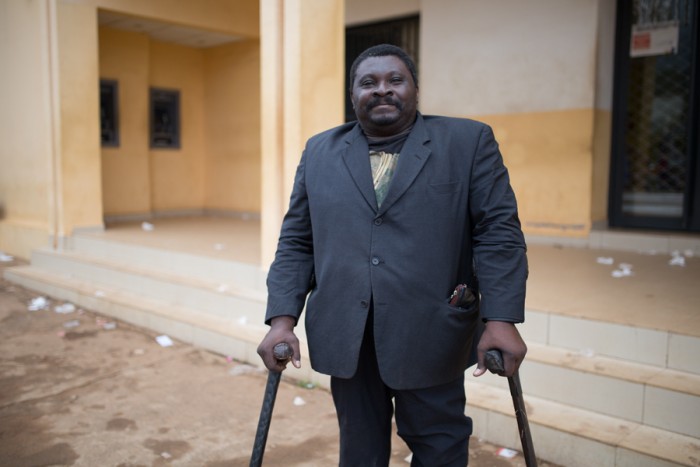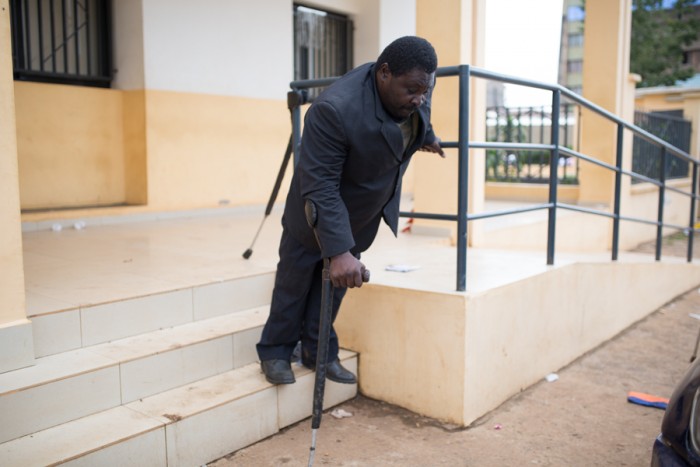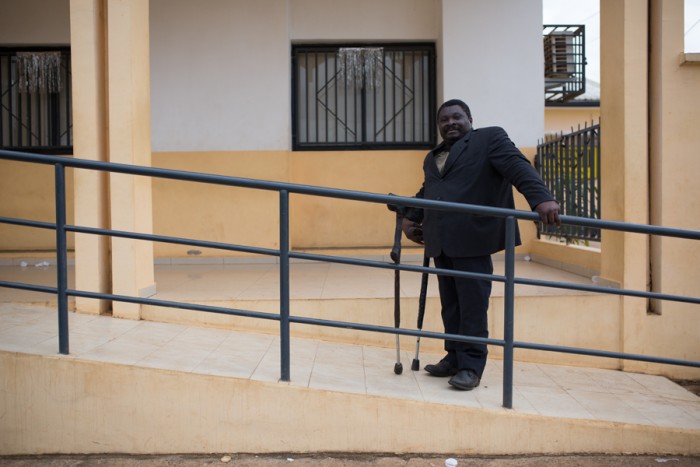May 7th, 2016 by Rachel | Tags: Disability, Peace Corps, Persons with Disabilities of Cameroon, Photography | No Comments »
During the last seven months of my Peace Corps service, I am featuring photographs and stories of several persons with disabilities living in Cameroon. All the photos are part of a series called “Persons with Disabilities of Cameroon.” The goal of presenting photographs and their stories is to create better awareness about the plights that persons with disabilities face in a developing country. When I return to the US, I hope to exhibit this series in a gallery and publish a book to educate others about persons with disabilities living in developing countries as this topic is so rarely discussed in the media.

Dr. Alfred Ndi is one of the very few persons with disabilities who is financially successful. It was his parents’ dedication to ensuring that he received the best quality of education growing and his determination that allowed him to succeed in receiving a PhD and becoming a professor at University of Bamenda. In spite of being a successful person, like all other persons with disabilities in Cameroon, he still faces barriers.
He had polio when he was two and a half years old. He was walking and playing with ease before having polio. When he was diagnosed with polio, he had fever and was taken to the hospital by his parents. The doctor applied quinnimax injection. His legs then became weak. “Back in the early 1960’s in Cameroon, people did not understand quinnimax and its effects,” said Dr. Ndi.
Shortly after his diagnosis of polio, Dr. Ndi said that neighbors said that witchcraft caused paralysis. “My parents refused to hear those words,” he said.
“They tried all kinds of remedies such as traditional medicines. Hospital medicines. [Then] somebody advised my parents not to waste time on treatments and send me to school,” he said. His parents were taking him to place to place for traditional treatments for several years. He did not finally start going to a primary school, Presbyterian Boys School, until the age of nine years old in 1970 in Limbe where he was born and raised.
“I was very intelligent. I was promoted twice. The teachers in class one felt like they were wasting me time and so they sent me to class two. Then in class two in the same year, I passed the exams to class three. Then in class three, the teachers saw that they were wasting me time and so they promoted me to class four. I wrote the exam for class four and passed and went to class five. Class six and seven , I passed the first school living certificate in 1975, and I graduated from primary school.”
Dr. Ndi experienced some bullying due to his disability and inability to play sports while attending primary school. “I remember in primary school the children made fun of me because I was the only disabled person in the school and so, they liked to play with me but I did not like to play and so they did not understand why I did not like to play. For instance, they would force me to play football with them. I would fall down when playing football especially when I would try to kick the ball and miss it. And so I lost my balance. So, I did not like to play football but the children enjoyed seeing me fall down. So I refused to play football, they will bully me and try to beat me if I did not go play football with them. I used my sticks to kick the ball and I missed the ball. But I was a good goal keeper and I never missed to stop the ball from entering the goal post.”
Dr. Ndi grew up in a home with very loving but strict parents. “My parents especially my mother was disciplinary. My mother would discipline me very much. She would not let me go out and visit and play with friends even to the Botanical Gardens. So she was very strict with me,” he said. “I sneaked when I went to school especially during the break time because the school was next to the gardens. My parents would control me a lot,” said Dr. Ndi.
When I asked him if they were strict to him because of his disability, he said, ” I think it was partly because of my disability but also because they loved me very much. They were afraid that if they allowed me to move around, I may get into problems of any kind. So it was a way of them to protect me because I am the only son. I was an inquisitive child because I liked to go out and see things and experiment things but that was not to the liking of my parents. They wanted me to stay by their side. They were afraid that I may go out and have an accident and they would lose me.”
Then he went to secondary school called Government Secondary School in Limbe and graduated from there in 1980. Then from 1980 to 1982, he went to high school at CCAST Bambili, a village near Bamenda. Then in 1985, he finished first degree in bilingual studies. From 1984 to 1985, while he was studying for his first degree, he studied in France at Université Jean Moulin III in Lyon. After completing his first degree, he went to the UK to participate in a program on knowledge management. Then he returned to Cameroon where he completed a masters degree in applied linguistics in 1987 and a post-masters called M.Phil in cultural studies 1991. Then he finally began pursuing his PhD in 1991 in knowledge management and critical studies and completed it in 2006.
While pursuing his masters degree and PhD, he taught at University of Yaounde I from 1986 to 1991. Then he relocated to Bamenda and began teaching at University of Bamenda in 1992. Today, he is still teaching at University of Bamenda.
“As a professor, do you face any kind of discrimination because of your disability?” I asked Dr. Ndi.
“No. Not any kind of discrimination. On contrary, the school administrators and my colleagues, they respect me a lot,” he said.
“What kind of challenges do you face as an adult with disability?” I asked.
“Accessibility. Like getting to a building. No ramps. No lifts,” he said.

Dr. Ndi demonstrates his struggles to use the stairs.
Dr. Ndi took me to a bank one day that had a ramp. When he showed me the ramp at the bank, he shared with me that he advocated to get the bank build the ramp. “I talked with the bank director and because I have a bank account with them, I told him that if they don’t build a ramp, I will bring all disabled persons here and have them block the bank until the ramp is built. It took six months of constant reminders for them to finally decide to build this ramp and the decision to build a ramp was taken and it took them just one month to build it. And after they built it, many other banks followed the suit and built their own ramps. So, on Commercial Avenue, you’ll see ramps built in front of banks. And I also persuaded University of Bamenda to build ramps into all facilities and schools of the university and they complied. Churches are also building ramps thanks to this example.”

Dr. Ndi shows the ramp that he was able to persuade the bank to build.
“I don’t look at challenge as a problem. But as an opportunity to help others because I understand very well the difficulties that other disabled person go through when it comes to accessibility issues. So, it’s really not a problem to me because whenever I want to work, I go to a place that has a level ground. I do work in there. I don’t move around in quarters where accessibility is a challenge. One of the major concerns which I have beyond my disability has to do with the system of higher education in Cameroon. I think that the system is underperforming because it is not managed well and so, it is not competitive enough,” said Dr. Ndi.
